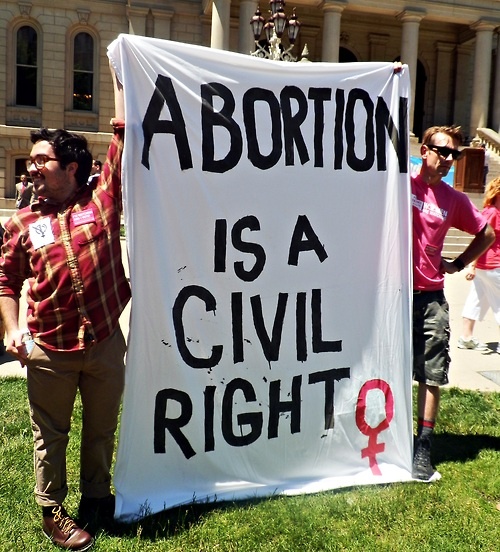New Hampshire Democrats are using abortion cases before the U. S. Supreme Court to renew their push for unrestricted abortion access in the Granite State.
“We are at a crisis moment for abortion rights: The threat to the constitutional right to an abortion has never been greater in our country. Six months from now, abortion could be illegal in half the country,” said Kayla Montgomery, vice president for public affairs at Planned Parenthood New Hampshire Action Fund.
The Supreme Court held oral arguments on Wednesday as it considers whether the state of Mississippi can ban abortion at 15 weeks. The court previously heard arguments on the Texas law banning abortion at six weeks, and a decision on that case is pending.
It’s possible the court could overturn either the 1992 Casey decision or the 1973 Roe decision, both of which restricted the right of voters to pass laws regulating abortion. Some court watchers believe they heard Chief Justice John Roberts suggest a way to leave the Mississippi law in place without overturning Roe.
A decision is expected in June.
Gov. Chris Sununu, a self-described pro-choice Republican who supports upholding Roe v. Wade, signed a 24-week abortion ban when he approved the state budget. The ban was forced into the budget bill by House conservatives who threatened to derail the legislation over the ban. He has since said he supports removing the requirement that all women seeking abortions be required to undergo an ultrasound first.
According to Cornerstone, a non-partisan, non-profit Christian advocacy organization, the description of the ultrasound as mandatory is inaccurate.
“Under the act, performing an abortion without an ultrasound will only be punished in one situation: where there is a “substantial risk” that the child is at least 24 weeks old. In any other circumstance, the provider can skip the ultrasound and face no penalties under the act,” the group says in a fact sheet on the new law.
Asked about the Mississippi case this week, Sununu told NHJournal he wasn’t paying attention to it and does not believe Roe will be overturned.
Devon Chaffee, executive director of the ACLU of New Hampshire, said if the Supreme Court ends Roe, abortion in New Hampshire is still legal for the first six months. Chaffee and Montgomery stood with state lawmakers on Wednesday promising legislative action to make sure abortion stays legal no matter what happens in Washington.
“Unfortunately, it is no longer an option for us to count on the U.S. Supreme Court to protect our reproductive rights,” said state Sen. Rebecca Whitley, D-Contoocook. “Now is the time to take proactive action to protect abortion access in New Hampshire.”
Democrats want abortion rights codified in state law, and they are pushing to undo the 24-week ban and return to the policy of unrestricted legal abortion at any point in a pregnancy.
All the members of New Hampshire’s congressional delegation came out in support of upholding Roe on Wednesday, as well as the federal effort to make sure abortion rights are protected from the Supreme Court. Rep. Chris Pappas said the Women’s Health Protection Act, supported by all members of the delegation, will codify Roe as federal law.
“We can no longer count on the Supreme Court to defend Roe and be the backstop as they have been – in this new era it’s up to us to fight back,” Pappas said.
Supporters of overturning Roe v. Wade have long argued that abortion should be regulated by the democratic process as Pappas suggests, not a court’s ruling.
Sen. Maggie Hassan called the Mississippi ban “extreme” and devastating for women.
“This is one of the most extreme abortion bans in the country and it would take us back to almost 50 years ago,” Hassan said.
Shannon McGinley, executive director of Cornerstone Action of New Hampshire, called out Democrats for equating New Hampshire’s 24-week ban with Mississippi’s law or the fetal heartbeat bill in Texas.
“The currently pending Supreme Court cases challenging abortion law in Mississippi and Texas are not going to have any legal effect on our law in New Hampshire,” McGinley said. “Our law prohibits abortion at six months, not 15 weeks (Mississippi) or six weeks (Texas). Those trying to link New Hampshire’s moderate law with these other states are ignoring the facts.”
Both major Supreme Court abortion decisions, Roe and Casey, allow for states to restrict abortion at some point in the pregnancy. Even those restrictions are considered loose compared to most developed countries, which set the limits at 12 to 15 weeks for elective abortions.
McGinley said Democrats are engaging in misinformation to push for complete, unrestricted access to abortion.
“Planned Parenthood’s position and messaging is predictable in its attempt to cynically sway public opinion,” she said. “With every elected branch of government in New Hampshire led by Republicans, not by Planned Parenthood, there is no reason why we shouldn’t be able to protect a law with absolutely no impediment to abortion access in those first six months, but that does balance that access with commonsense protections for the late-term pre-born.”

